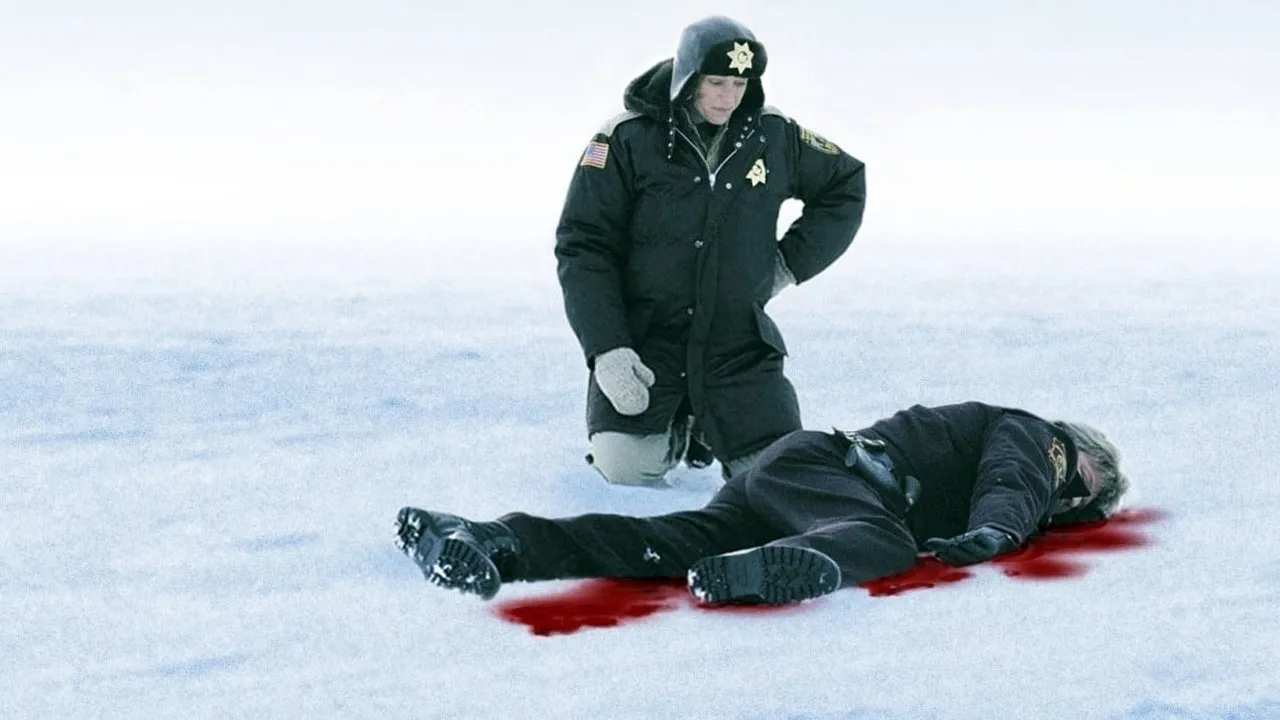
There are many things that separate author of this review from the majority of film reviewers. Opinion about Coen Brothers is one of them. While most of other critics and film scholar fall on their knees any time someone mentions those film makers, I tend t approach their films with significantly less enthusiasm. Many of Coen Brothers' so-called masterpieces were, in my humble opinion, overrated. However, there are some instances where majority opinion on Coen films and my opinion are more-or-less the same. Fargo, written and directed by Joel and Ethan Coen in 1996, is one of such examples.
The film got its title after Fargo, city in North Dakota where one of the protagonists - Jerry Lundegaard (played by William H. Macy), used car salesman from Minneapolis - comes in order to recruit two small-time criminals - Carl Sholwater (played by Steve Buscemi) and Gaear Grimsrud (played by Peter Stormare) - for the scheme that would solve his financial problems. Those problems were supposed to be solved by Jerry's wealthy father-in-law Wade Gustafson (played by Wade Presnell), but the old man never liked Jerry. So, Jerry devised the plan to arrange the kidnapping of his own wife in order to extort money from penny-pinching father-in-law. However, even the best plans are doomed by inept execution, and immediately after the kidnapping two criminals are stopped by state trooper because of minor traffic violation. This results in a murder, which only lead to more murders, and as bodycount increases, Jerry desperately wants to salvage his plan. The new obstacle he must overcome is in the form of Marge Gunderson (played by Frances McDormand), seventh-month pregnant policewoman from Brainerd, Minnesota who investigates murders and quickly realises that the trail leads to Minneapolis.
If Coens' first feature Blood Simple was known as film noir, Fargo could be best described as "film blanc". This is due to the whiteness that dominates the winter scenery of Minnesota, their home state. In Fargo the audience is going to experience something more than sights of Minnesota - the most noticeable things are going to be very recognisable accents, names and mannerisms of the local people, inherited from Swedish settlers. (A friend of mine, who has recently passed away, had described his experience of Minnesota and told me that Coen Brothers got everything right, except for ignoring Minnesotan leftist politics, also inherited by Scandinavian settlers.) Fargo is, therefore, another good example that USA is much more diverse country than most of Hollywood films would make us believe.
Local eccentricities aside, Fargo shows Coens' film-making ability at their best. Using very simple, but effective film-making techniques, they easily lead the audience through complex story and paint gallery of interesting characters. But their greatest achievement with Fargo is the fact that they managed to find something that had been slipping from them in some of their previous films – right balance between humour and dark overtones in this black comedy. The violence portrayed in this film is horrific, because it is completely random and happens to decent people. Even more horrific is the fact that the people committing atrocities aren't some kind of evil psychopaths; instead we see few pathetic creatures who would otherwise be worthy of our pity (especially character played by excellent William H. Macy) and who do what they do for the lack of intelligence. All this darkness is accompanied with irony, even at the very beginning, when the falsely claim that the events in film were based on true story. What makes this irony bearable is Coens' humanism - unlike many of their previous films, they give us some kind of ethical basis from which we could judge the events and character.
This ethical basis comes in the form of Marge Gunderson. This role was tailor-made for Joel Coen's wife Frances McDormand, and she met the film makers' expectation splendidly, later being awarded with Oscar for her effort. While almost anyone in this film is shown as incompetent, greedy, weak or pathetic, Marge is the only character we can root for her, especially since she proves to be very competent in her job. She might look like a stuffed turkey, but in Fargo this stuffed turkey convincingly takes care of bad guys. The film could have been even better if Marge's character didn't resort to needless preaching at the end. McDormand's performance is matched with many of her colleagues, including Steve Buscemi as over-talkative and terminally stupid criminal or Peter Stormare as his silent but creepy partner. Acting in the film is matched by very good music score by Carter Burwell, which might sound somewhat too epic for black comedy. On the other hand, this score fits endless snow- covered plains of Minnesota quite nicely. Fargo might not be the masterpiece, but it still represents one of the more pleasant instances of this reviewer's opinion joining general consensus.
RATING: 8/10 (+++)
(Note: The text in its original form was posted in Usenet newsgroup rec.arts.movies.reviews on January 20th 2003)
==
Blog in Croatian https://draxblog.com
Blog in English https://draxreview.wordpress.com/
Cent profile https://beta.cent.co/@drax
Minds profile https://www.minds.com/drax_rp_nc
Uptrennd profile https://www.uptrennd.com/user/MTYzNA
Brave browser: https://brave.com/dra011
BTC donations: 1EWxiMiP6iiG9rger3NuUSd6HByaxQWafG
ETH donations: 0xB305F144323b99e6f8b1d66f5D7DE78B498C32A7

